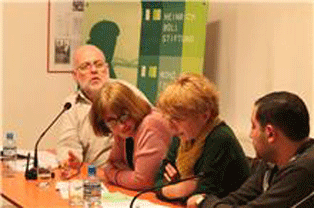Nino Tsagareishvili
The hate speech used in the Georgian media is a reflection of the tendencies established in Georgian society. It is a sad reality that certain social groups in Georgia are subject to verbal assault and persecution. But is it essential to prohibit hate speech by legislative means? Will such regulation endanger the freedom of expression? How efficient can the public debates and other educational means be for solving this problem?
The public discussion, entitled “Hate Speech in Georgia: What is the Borderline between Freedom of Expression and a Crime?” held at the Boell Foundation on April 6th was dedicated to these matters. The main speakers were the Head of the Council of the Charter of Journalism Ethics, Zviad Koridze, the Executive Director of the Civil Integration Foundation, Zaur Khalilov, the Director of the Women’s Initiative Support Group (WISG), Ekaterine Aghdgomelashvili and lawyer of the Constitutional Litigation of the Georgian Young Lawyers Association (GYLA), Giorgi Gotsiridze. Journalist Nino Bekishvili moderated the discussion.
While discussing the causes of hate speech, Zviad Koridze noted: “hate speech is a characteristic of patriarchal society where there is a total deficit of civil values. It is also a feature of autocratic governance, which tries to divide the public in two opposing parts. The fact that hate speech is not only a problem of our media, but our society in general is predetermined by the coexistence of these two processes – the patriarchal state of our society and autocracy of the government.”
Other speakers also commented on this problem of society: “I had an opportunity to talk to the chief editors of those newspapers which have been using hate speech for years. They all state the same: This topic is very popular. Society is interested in it,” – stated Zaur Khalilov.
“When we talk about hate speech, let us not forget that the media is only a magnification of the reality of the public. This is not just a problem of media. This is a problem of society,” – noted Ekaterine Aghdgomelashvili.
While discussing the legislative mechanisms related to the hate speech, Giorgi Gotsiridze emphasized the lack of effective mechanisms in Georgian legislation: “There are only two laws that concern hate speech, the Law on Assemblies and Manifestation and the Law on Broadcasting. However, these regulations are not effective and cannot ensure the prevention of hate speech and the proper response to it,” – he stated.
Giorgi Gotsiridze was the only speaker who considered it necessary to establish legislative prohibition of hate speech: “The criminal means is not the only way to ensure the adequate state response to hate speech, but it is essential that the state uses these means towards those extremist groups who will not stop to use hate speech otherwise, i.e. by educational or administrative means.”
Ekaterine Aghdgomelashvili supports the usage of public debates and other education means against the hate speech: “We do not have many freedoms and if I had to choose, I would choose less state interference. There are a lot of examples of how hate speech is regulated in other countries i.e. professional unions and other educational means… Let us talk about this. Let us have public discussion, but restrain from censorship.”
The auditorium actively got involved in the discussion. The question by blogger Shota Khinchagashvili was addressed to the speakers who do not support the legal prohibition of hate speech: “Is it not naïve to think that education can solve this problem? This can bring results after several years, but what can we tell the modern generation, the people who are direct subjects of persecution.
Zviad Koridze sees the threat of repressions in case of hate speech being criminalized: “If we criminalize hate speech, the public will be passive here. It will be always controlled by the political forces and the government. The control mechanisms will entirely pass to the hands of government. Today, it is in the hands of the public. The public can work these mechanisms.”
Members of the auditorium expressed their opinions regarding the regulation of hate speech. Vakhushti Menabde, a lawyer of GYLA, supports the American model of hate speech regulation: “Hate speech shall be criminally persecuted only when it creates a direct and instant threat… when the verbal violence grows into real violence and violation of human rights.”
In sum, it should be noted that the discussion was rather dynamic and interesting.




